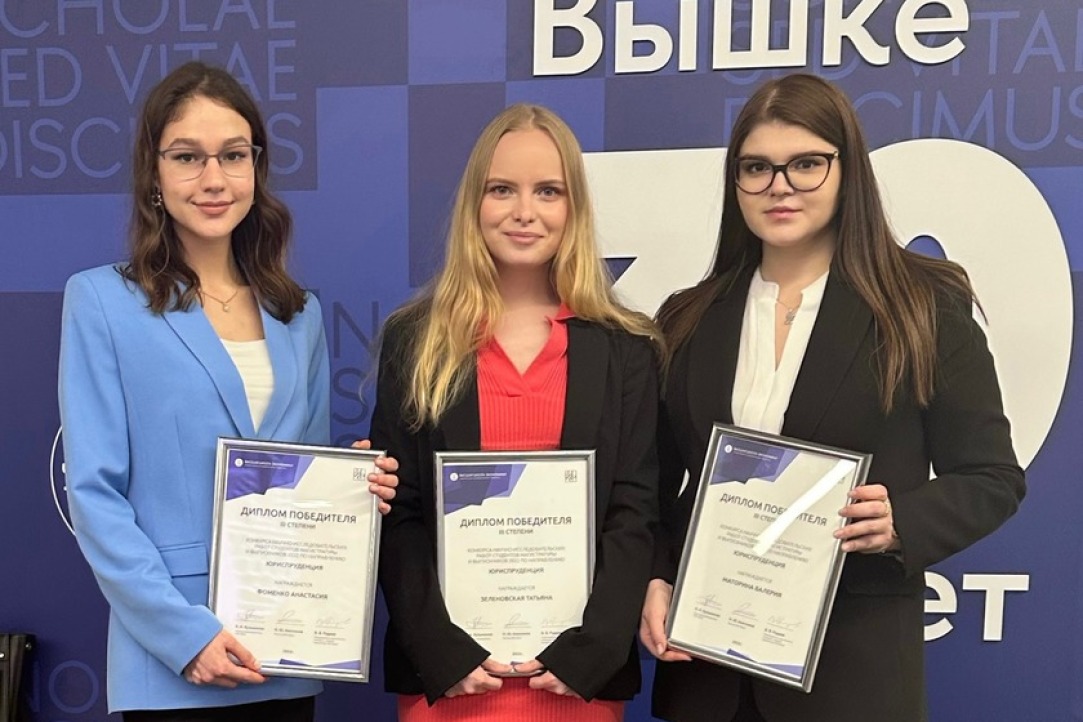- A
- A
- A
- ABC
- ABC
- ABC
- А
- А
- А
- А
- А
- HSE University
- Faculty of Law
- School of International Law
- News
- Papers on International law among the Prize-Winners and Laureats of the HSE Student Research Paper Competition
-
School
- About the School
- Research
- Academics
- "HSE University Journal of International Law"
-
Research and Study Laboratories and Groups
-
Research and Study Laboratories
-
Research and Study Groups
-
- Research and Methodology Units
- HSE Research Seminar on International Law
- Ph.D. Seminar
- Undergraduate track ‘International Law’
-
Projects
-
Status: active
- Applied project «Philip C. Jessup international law moot court competition training 2023-2024»
- Applied project 2024-2025 “Preparation for the Willem C. Vis Moot Competition, season 2024-2025”
- Fundamental Research Project "Legal Mechanisms for Overcoming Inequality"
- Participation of Young Lawyers as Clerks of the International Commercial Arbitration Court at the Chamber of Commerce and Industry of the Russian Federation
- Research project: International Competition ‘Dispute Resolution in the EAEU–2024’: Preparation and Participation of the Faculty of Law's Team
-
Status: completed
-
- Staff Members
-
Educational programs
- Bachelor's Programmes
- Master's Programmes
- Doctoral School of Law
Moscow, 3 Bolshoy Trekhsvyatitelsky Pereulok, rooms 227, 228b

E-mail: svetlana.smirnova@hse.ru
Located at a crossroads of global, regional, and national interests, contemporary international law affects almost all spheres of society. The School of International Law keeps pace with significant international events and legal adjudication in order to provide hands-on education that prepares future lawyers and legal scholars for the demands of the current legal landscape. The School is at once a ‘think tank’ that provides expert analysis and a producer of top legal experts and lawyers in international law.
 The Right to Regulate in International Economic Law: Towards a General Theory with Lessons from the GATS
The Right to Regulate in International Economic Law: Towards a General Theory with Lessons from the GATS
Göttingen: Universitätsverlag Göttingen, 2024.
Journal of World Trade. 2025. Vol. 59. No. 5. P. 773-794.
Vladislav Starzhenetskiy, Sabina Geydarova.
In bk.: Новые горизонты международного арбитража. Выпуск 8.. Iss. 8. 2025. Ch. 17. P. 439-461.
 MANDATORY CORPORATE HUMAN RIGHTS DUE DILIGENCE MODELS: SHOOTING BLANKS?
MANDATORY CORPORATE HUMAN RIGHTS DUE DILIGENCE MODELS: SHOOTING BLANKS?
Rusinova V., Sergei K.
Law. LAW. Высшая школа экономики, 2021

Papers on International law among the Prize-Winners and Laureats of the HSE Student Research Paper Competition

A research paper named “Exceptio Non Adimpleti Contractus and a Problem of Overinclusiveness in International Law” has taken the third place in the Master’s level Law section of the annual HSE Student Research Paper Competition. Its authors are Valeria Matorina, Tatiana Zelenovskaia, and Anastasia Fomenko, the second-year students of the Master’s Programme “Law of International Trade and Dispute Resolution”, who conducted their research under the supervision of Professor Vera Rusinova, the Head of International Law School. Another award, a diploma of laureate of the competition, went to the PhD student of the International Law School Vadim Absalyamov and his paper “The notion of ‘overlapping jurisdiction’ under the WTO law and international investment law”.
The prize-winners, Valeria Matorina, Tatiana Zelenovskaia, and Anastasia Fomenko, are sharing their experience of preparation for the competition and overall impressions after receiving the award:
The story about the work on our research paper is quite peculiar. Initially, it was supposed to be a group research project for the course of Professor Rusinova on the Law of International Treaties. In short, we were required to pick an underresearched issue in the field of international treaties, develop a research question, and propose new approaches to dealing with the problem at hand. In this regard, we have chosen the topic of “Diversity of grounds for treaty termination and suspension”. However, as you might have noticed, the topic of the prize-winning paper is ultimately different.
As we were working on the project, we noted the relative lack of research on the exceptio non adimpleti contractus principle as a ground for a suspension of international treaties. This issue had never been approached from the perspective we chose, neither in international nor national academic circles. Therefore, we decided to deepen the research and to adapt it for the Student Research Paper Competition.
So, what is the secret of your success?
Probably, the unconventionality of approach to our research has benefited our paper. We find our paper unique because the research question itself was disregarded by most scholars, and the proposed solution to the practical issue is unconventional for legal papers because it is based on the intertwining of international law and behavioural economics.
Accordingly, we believe that our paper’s specificity lies with the application of non-formalistic methodological approaches to international law. In particular, we identified the disturbing diversity of the grounds for treaty termination and suspension by using critical analysis. It was particularly significant to consider the issue critically when we approached the suspension of international treaties on the basis of the exceptio non adimpleti contractus principle. There is a debate among scholars over the origin of the principle: it is not settled whether it belongs to the law of international treaties (VCLT) or to the state responsibility (ARSIWA). Some consider it as an autonomous principle that does not fall under any of these branches of international law. For our part, we leave these questions for the reader.
We also suppose that a key input of our research is the “revival” of the exceptio non adimpleti contractus principle in the international legal discourse. The earlier academic writings expressed strong scepticism about the very existence of such principle in public international law. In contrast, we attempted to demonstrate that it is not only alive and is actively present in international practice, but it also creates certain challenges.
We informally named the suggested approach as a “donkey theory”… We hope that all readers of this interview will be curious to read our paper at least to know what is hiding under this odd name.
We asked whether the authors were expecting to win and what emotions they felt when they found out about third place, the students gave the following answer :
Yes, frankly, we hoped to win a prize because we did our best to adapt the research specifically to the format of the Student Research Paper Competition. It is quite difficult to set out such a broad issue briefly, as it requires demonstrating approaches of international courts, historical aspects of the emergence of the principle, and, obviously, possible ways of its application. As a result, we definitely have a lot to add! We were very much imbued with our work and the topic as a whole. That’s why when we found out about winning the prize in such a serious competition, we were genuinely pleased and proud of our work that became our true companion in those hours and days spent in front of computer screens.
Finally, the prize-winners shared their advice for those who are thinking about participating in the Competition:
It is very important to develop a strong research question since it will determine the whole rhythm to the future work.
In addition, when preparing a paper in the field of international law, we recommend not limiting oneself to the conventional formalistic approach, but taking into account the existence of a variety of viewpoints and approaches regarding international law and remembering the significance of critical thinking. There is no doubt that these tips apply to writing any academic paper, they are simple but super useful!
Notably, this is also our first research experience at such a high level. Accordingly, after having this experience, we genuinely believe that there is no need to worry about a lack of writing or research skills! What is for sure is that it is not something that can prevent you from writing a legitimately great research paper. Each student has a real chance of winning the Student Research Paper Competition if they put enough effort into it.
- About
- About
- Key Figures & Facts
- Sustainability at HSE University
- Faculties & Departments
- International Partnerships
- Faculty & Staff
- HSE Buildings
- Public Enquiries
- Studies
- Admissions
- Programme Catalogue
- Undergraduate
- Graduate
- Exchange Programmes
- Summer Schools
- Semester in Moscow
- Business Internship
-
https://elearning.hse.ru/en/mooc/
Massive Open Online Courses
-
https://www.hse.ru/en/visual/
HSE Site for the Visually Impaired
-
http://5top100.com/
Russian Academic Excellence Project 5-100
- © HSE University 1993–2025 Contacts Copyright Privacy Policy Site Map
- Edit

